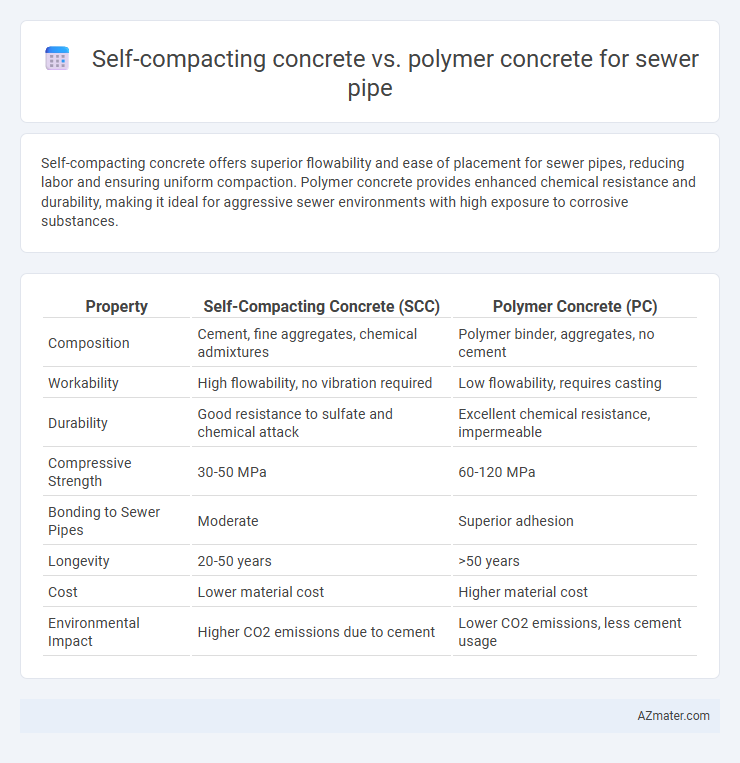Self-compacting concrete offers superior flowability and ease of placement for sewer pipes, reducing labor and ensuring uniform compaction. Polymer concrete provides enhanced chemical resistance and durability, making it ideal for aggressive sewer environments with high exposure to corrosive substances.
Table of Comparison
| Property | Self-Compacting Concrete (SCC) | Polymer Concrete (PC) |
|---|---|---|
| Composition | Cement, fine aggregates, chemical admixtures | Polymer binder, aggregates, no cement |
| Workability | High flowability, no vibration required | Low flowability, requires casting |
| Durability | Good resistance to sulfate and chemical attack | Excellent chemical resistance, impermeable |
| Compressive Strength | 30-50 MPa | 60-120 MPa |
| Bonding to Sewer Pipes | Moderate | Superior adhesion |
| Longevity | 20-50 years | >50 years |
| Cost | Lower material cost | Higher material cost |
| Environmental Impact | Higher CO2 emissions due to cement | Lower CO2 emissions, less cement usage |
Introduction to Sewer Pipe Materials
Self-compacting concrete (SCC) and polymer concrete represent advanced materials used in sewer pipe construction, each offering distinct benefits. SCC provides excellent flowability and compaction without vibration, ensuring dense, durable pipes resistant to corrosion and abrasion. Polymer concrete, made from resin binders and aggregates, exhibits superior chemical resistance and high tensile strength, making it ideal for aggressive sewer environments.
Overview of Self-Compacting Concrete (SCC)
Self-compacting concrete (SCC) is a highly flowable concrete that can spread into place and encapsulate reinforcement without the need for mechanical vibration, offering superior workability compared to traditional mixes. It consists of a carefully balanced mix of fine aggregates, cement, and chemical admixtures to achieve high deformability and segregation resistance, making it ideal for complex sewer pipe molds. SCC provides enhanced durability and reduced permeability, crucial for sewer pipes exposed to aggressive environments, ensuring long-term structural integrity and reduced maintenance.
Overview of Polymer Concrete
Polymer concrete for sewer pipes is a composite material combining aggregates with polymer resins, offering superior chemical resistance and low permeability compared to traditional concrete. Its enhanced durability against aggressive sewage environments reduces maintenance and extends service life significantly. Polymer concrete also provides improved mechanical strength and rapid curing times, making it a reliable choice for underground infrastructure.
Material Composition: SCC vs Polymer Concrete
Self-compacting concrete (SCC) for sewer pipes is formulated with a high cement content, fine aggregates, chemical superplasticizers, and viscosity-modifying agents to achieve flowability without segregation, ensuring uniform filling and dense microstructure. Polymer concrete, in contrast, combines traditional aggregates with synthetic polymer binders such as epoxy or polyester resins, resulting in enhanced chemical resistance and reduced permeability. The distinct binder types in SCC and polymer concrete influence their mechanical properties and durability in aggressive sewer environments.
Mechanical Properties and Strength Comparison
Self-compacting concrete (SCC) for sewer pipes exhibits high compressive strength typically ranging from 40 to 60 MPa and superior workability, ensuring uniform filling without vibration. Polymer concrete demonstrates exceptional mechanical properties, including tensile strength up to 15 MPa and enhanced chemical resistance, making it ideal for corrosive sewer environments. Comparative studies indicate that while SCC provides robust compressive strength and ease of placement, polymer concrete offers superior tensile strength and durability against aggressive wastewater chemicals.
Chemical and Corrosion Resistance
Self-compacting concrete (SCC) exhibits superior chemical resistance due to its dense microstructure and low permeability, effectively minimizing the ingress of aggressive agents like sulfates and chlorides commonly found in sewer environments. Polymer concrete, composed of resin binders instead of cement, offers excellent corrosion resistance by forming a non-porous barrier that resists acids, alkalis, and microbial-induced corrosion typical in sewage systems. Both materials provide enhanced durability, but polymer concrete generally outperforms SCC in resisting aggressive chemical attacks in highly acidic sewer conditions.
Installation and Workability in Sewer Applications
Self-compacting concrete (SCC) offers superior flowability and ease of placement in complex sewer pipe forms without mechanical vibration, reducing labor and installation time. Polymer concrete provides excellent chemical resistance and higher tensile strength but requires precise mixing and curing conditions that may complicate onsite installation. SCC's high workability is ideal for rapid construction and tight spaces, whereas polymer concrete is preferred for high durability in aggressive sewer environments despite longer handling requirements.
Durability and Longevity in Harsh Sewer Environments
Self-compacting concrete (SCC) offers superior durability in harsh sewer environments due to its dense microstructure and high resistance to chemical attack, reducing permeability and preventing ingress of aggressive substances. Polymer concrete exhibits exceptional chemical resistance and corrosion resistance, significantly enhancing longevity against sulfuric acid and other sewer gases. Comparing both, SCC provides better structural integrity and ease of placement, while polymer concrete excels in long-term chemical durability, making material selection dependent on specific sewer conditions and maintenance requirements.
Cost Considerations and Lifecycle Analysis
Self-compacting concrete offers cost advantages in reduced labor and faster placement, whereas polymer concrete incurs higher initial material expenses but benefits from exceptional durability and chemical resistance in sewer pipe applications. Lifecycle analysis shows polymer concrete typically delivers lower maintenance costs and longer service life due to superior corrosion resistance, while self-compacting concrete may require more frequent repairs under aggressive sewer environments. Evaluating total cost of ownership clearly highlights polymer concrete's advantage in long-term performance despite its upfront investment.
Choosing the Best Concrete for Sewer Pipes: Conclusion
Self-compacting concrete offers superior workability and reduced labor costs for sewer pipes due to its high flowability and ability to fill complex molds without vibration. Polymer concrete provides enhanced chemical resistance and durability, making it ideal for aggressive sewer environments with corrosive substances. Selecting the best concrete depends on balancing the need for structural integrity, environmental exposure, and maintenance requirements specific to sewer pipe applications.

Infographic: Self-compacting concrete vs Polymer concrete for Sewer pipe
 azmater.com
azmater.com